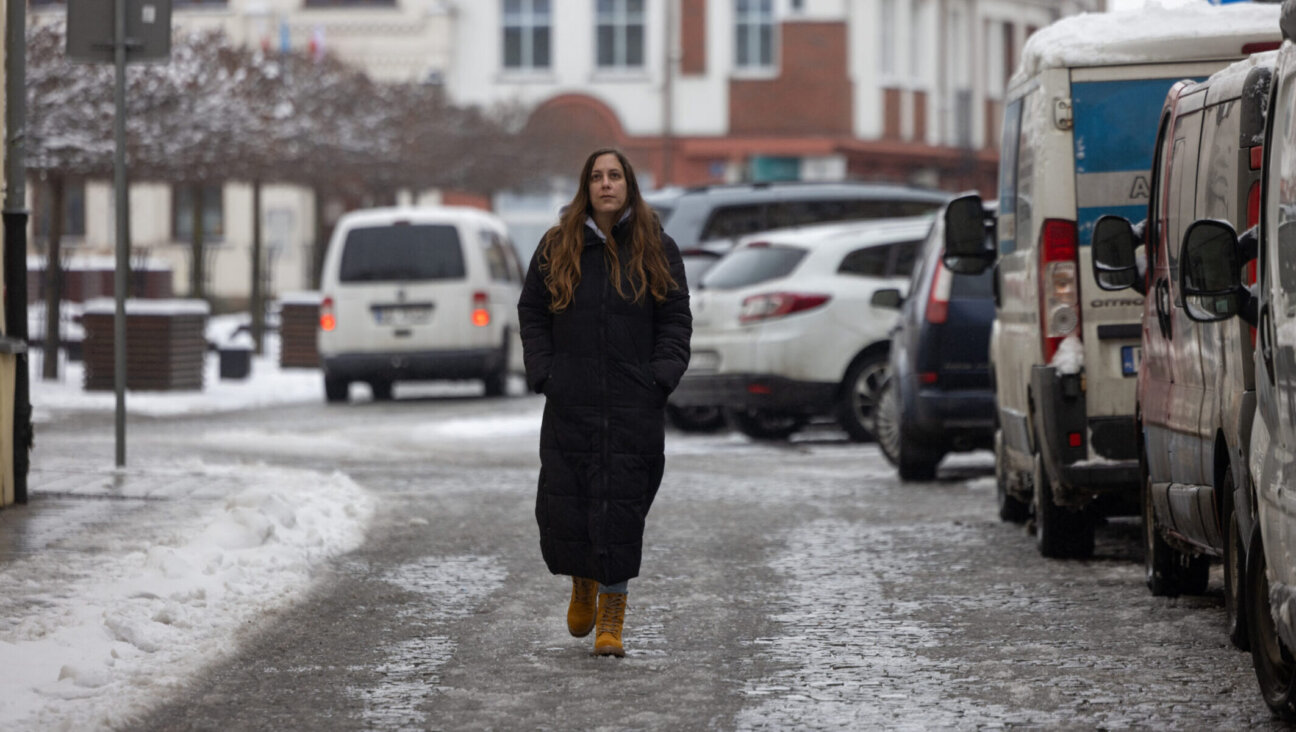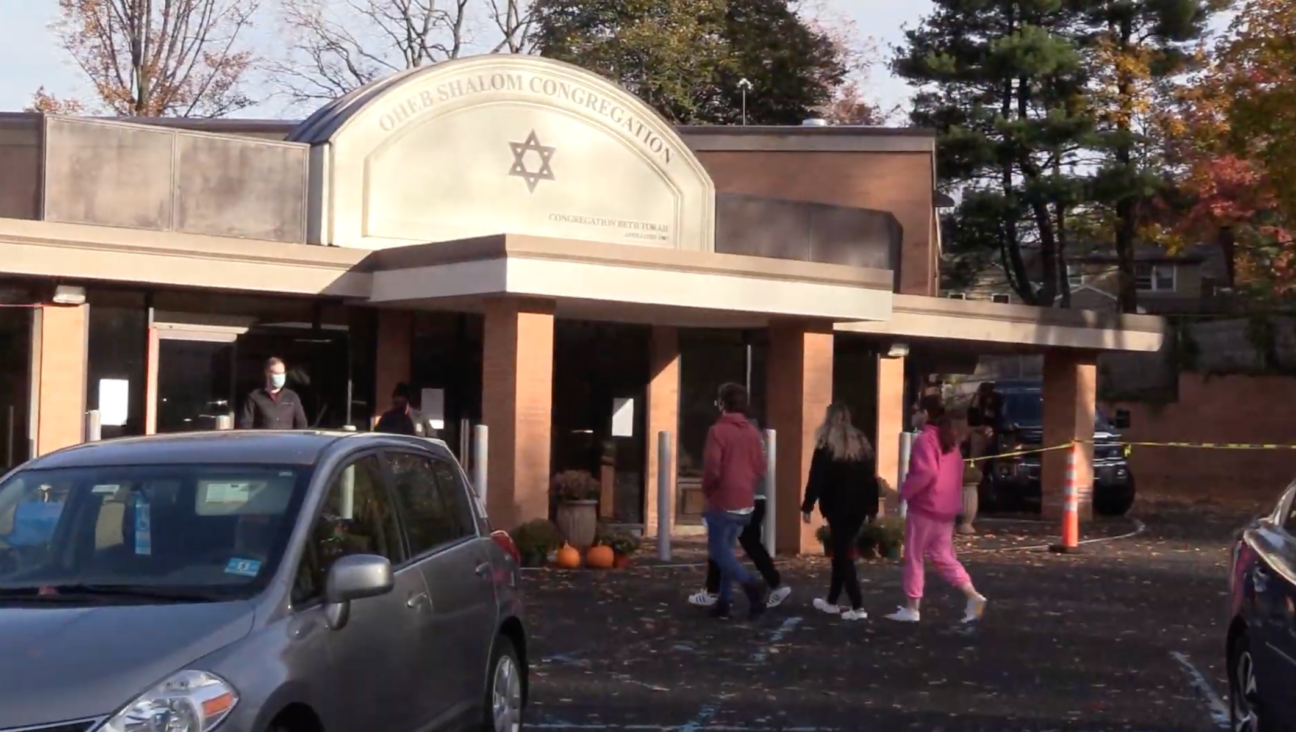Circumcision Rite Goes Unregulated Outside New York

Image by haaretz
As New York City health authorities and ultra-Orthodox groups clash over metzitzah b’peh, officials in other cities are making no effort to regulate the risky oral suction technique sometimes used during ritual circumcision.
In fact, unlike in New York City, health authorities elsewhere often have no mandate to monitor the incidence of the herpes strain known as HSV-1 that babies can contract from the procedure. The disease’s consequences for adults are seldom serious, but HSV-1 can cause developmental disabilities, nerve damage and occasionally death in infants due to the underdeveloped state of their immune systems.
NEWS UPDATE: Orthodox sue New York over forms for circumcision rite.
Assessing the possible risks and rate of infection is further complicated by the fact that outside the New York City area, even some ultra-Orthodox mohels and the families they serve appear to accept use of more sterile procedures, which are endorsed by local governments and rejected by many ultra-Orthodox groups in New York.
In Baltimore, which has a large ultra-Orthodox population, a representative for the county department of health said her office doesn’t “have anything to do with” tracking herpes or circumcision rites, and referred questions to the Maryland Office of Health Care Quality. A spokesperson from the state office confirmed that neonatal herpes was not mandated to be reported. “The Department agrees that this is not a safe practice,” the spokesperson wrote in an email, adding, “We are not aware of any cases associated with this practice in Maryland.”
The department’s lack of awareness could reflect the absence of mandated reporting of the illness. It might also reflect caution about antagonizing the community. In March, Helene King, a spokeswoman for Sinai Hospital, which serves Baltimore’s large ultra-Orthodox population, declined to answer even a general question from the Forward about babies with HSV-1 being admitted soon after their circumcisions. “With such a close-knit community as the Baltimore Orthodox one is, I would not want to chance that any family or families would realize they were in an article like this,” she wrote.
The Forward contacted several prominent mohels from Baltimore’s ultra-Orthodox community, including Rabbi Michael Henesch. None would agree to be interviewed about whether they used metzitzah b’peh.
Other cities with sizable ultra-Orthodox populations, such as Chicago, Los Angeles and San Francisco, do not mandate that herpes cases be reported to the state. In Canada, officials in Montreal and Toronto confirmed that herpes was a communicable disease to be reported, but they were not aware of any cases.
On September 13, the New York City Board of Health and Mental Hygiene passed the first known government regulation of metzitzah b’peh, a technique in which the mohel applies his mouth directly to the genitals of a male infant after the circumcision to suck the blood away from the site of the cut. The new regulation requires parents to sign an informed consent form before allowing a mohel to perform direct oral-genital cleansing.
According to the federal Centers for Disease Control and Prevention, metzitzah b’peh carries a high risk of HSV-1 transmission. As a result, the Board of Health suggested the use of sterile glass tubes, known as pipettes, as an alternative.
But efforts by the board to promote this method in the ultra-Orthodox community have been criticized by community leaders, who accused the city of infringing on religious freedoms.
Dr. Aaron Jesin, an Orthodox mohel who lives outside of Toronto, has practiced brit milah, — the Jewish circumcision ritual — for 34 years, including for Hasidic and other ultra-Orthodox families. He wrote in an email to the Forward that residents were “not as acutely aware of the problem of metzitzah b’peh and the [local] Board of Health has not been involved.”
Jesin said he used metzitzah b’peh in his circumcisions for approximately five years before an encounter with Rabbi Moshe Tendler, a Yeshiva University rabbinic school leader with a doctorate in microbiology. Tendler advocated the use of gloves and a sterile glass tube, and Jesin said he has since performed circumcisions with those accessories. Jesin said that in the rare case that a family insists on metzitzah b’peh today, he asks the father to perform that part of the ritual.
The increase in the use of sterile pipettes coincided with the rise in AIDS awareness during the late 1980s and early 1990s. Rabbi Mendel Altein, who has been a mohel since 1992, began performing circumcisions in Montreal in 1994. One year earlier, Altein, a Lubavitch rabbi, sought the advice of Lubavitch’s spiritual leader, Rabbi Menachem Mendel Schneerson, about performing circumcisions with a pipette, due to his concern about transmitting diseases. Altein said Schneerson told him that according to kabala, it was preferable to perform it “directly by mouth for spiritual reasons” and that Hasidim should do it “the most preferable way.”
Altein said, however, that today the majority of mohels in Montreal perform the technique with a tube, although the very religious parents still want the ritual executed through direct oral contact.
“We don’t need a consent form. I think that’s a bit much,” Altein said. “But every mohel, as a responsible mohel, should make sure parents are aware of it.” Altein said he notifies parents of the risks and, despite his own rebbe’s directive, uses a tube unless specifically asked not to. “For people who clearly want a b’peh [direct oral contact], the yeshivah and really religious, we still still do a b’peh,” he said. “If it’s Lubavitcher families, it’s understood I will do it with a tube.”
In Los Angeles, Rabbi Yehuda Lebovics, who has been a mohel for more than 30 years, related that he has performed circumcisions using a sterile pipette for many Hasidic families with no complaints from them. For his clients, “it hasn’t really been an issue,” he said. Lebovics said that the local health department had done “absolutely zero” to regulate metzitzah b’peh, but since it is not a common practice, there was little call for officials to do so.
Lebovics said that at one time he regularly performed metzitzah b’peh, but stopped after the rise of the AIDS epidemic, which was heavily publicized in southern California. He advocated the use of sterile pipettes to suction blood.
In an email to the Forward, Avi Shafran of Agudath Israel of America, the organization that has threatened legal action against the city, wrote that New York, having more ultra-Orthodox Jews than any other region in the United States, was a likely place for the issue to “come to a head,” and that “any mohel is entirely free to use whatever suction method he chooses, based on whatever authorities he looks to for guidance.”
But Shafran said that mohels who believe metzitzah b’peh is a “matter of religious conviction” should not be compelled to “‘re-examine’ their religious beliefs.”
New York City’s regulation goes into effect on October 21. Since 2004, there have been only 11 suspected cases of herpes transmission after circumcision; two of the infants died. Earlier this year, two New Jersey infants from the Orthodox community were infected after having had metzitzah b’peh, but they both survived. Dr. Margaret Fisher, chair of pediatrics at Monmouth Medical Center, told the Forward in March that the incidence of infection was “certainly a minuscule number, however, you could make that number be zero by not using your mouth to suction the blood.”
The city’s ruling did have an effect in nearby Rockland County, home to a large ultra-Orthodox population in and around Monsey. Commissioner of health Dr. Joan Facelle said her department was not implementing any method of informed consent, but was working with two local hospitals to share an informational brochure adapted from data gathered by the New York City Board of Health. From 2003 to 2004, three infants contracted herpes after circumcisions were performed by Rabbi Yitzchok Fischer from Monsey. In an August 2005 New York Times article, Fischer said through his lawyer that two of the infants had “herpes-like rashes before they were circumcised and were seen by a pediatrician who approved their circumcision.”
Samuel C. Heilman, an author and sociology professor at the City University of New York, said that metzitzah b’peh had become, “a cause célèbre” amongst some ultra-Orthodox Jews, or Haredim, as they are sometimes known. As a result, he said, “If someone wants to demonstrate they’re truly Haredi, they will have their child circumcised through metzitzah b’peh.” In a follow-up email, Heilman wrote that he wasn’t surprised the practice was not as widespread in other communities, but believed, “the more politicized it gets the more it has the potential to spread.”
Contact Seth Berkman at [email protected]
A message from our Publisher & CEO Rachel Fishman Feddersen

I hope you appreciated this article. Before you go, I’d like to ask you to please support the Forward’s award-winning, nonprofit journalism so that we can be prepared for whatever news 2025 brings.
At a time when other newsrooms are closing or cutting back, the Forward has removed its paywall and invested additional resources to report on the ground from Israel and around the U.S. on the impact of the war, rising antisemitism and polarized discourse.
Readers like you make it all possible. Support our work by becoming a Forward Member and connect with our journalism and your community.
— Rachel Fishman Feddersen, Publisher and CEO























